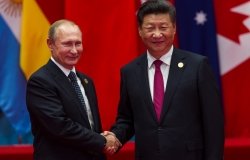Mongolia as the Link of Stability between Central and Northeast Asia
Tsedendamba Batbayar, director, Policy Planning and Coordination Department, Ministry of Foreign Affairs, Mongolia, and Wilson fellow;Eric A. McVadon, rear admiral (retired) and independent security consultant;Nyamosor Tuya, fellow, SAIS, Johns Hopkins University, and former minister of Foreign Affairs, Mongolia;Harry Harding, dean and professor, Elliot School of International Affairs, the George Washington University
Overview
Central Asia and Northeast Asia are among the most dynamic areas in the world. Located at the crossroads of Christian Russia, Confucian China and Muslim Central Asia, the decade-old democracy of Mongolia has the potential to provide a link of stability among these great civilizations. Four scholars explored Mongolia's strategic choices in a seminar at the Woodrow Wilson Center.
Wilson Fellow Tsedendamba Batbayar, who previously served as director for Policy Planning and Coordination in the Ministry of Foreign Affairs, Mongolia, presented a paper titled "Mongolia's New Identity and Security Dilemmas." According to Batbayar, Mongolia has faced a dilemma in seeking its identity, and choosing between being part of Central Asia or Northeast Asia. Sandwiched between two giants, Russia and China, Mongolia needs a third partner as a counterweight to balance relations with its two neighbors. This third power can be one country or a group of countries, able to provide necessary capital, technology and knowledge to Mongolia.
Eric A. McVadon, a rear admiral (retired) and independent security consultant, argued that the prospect of a Chinese or Russian military invasion of Mongolia by any means is not a realistic concern in today's world, in his paper "China, Russia, Mongolia, and Central Asia in the Coming Decade." This does not imply that Mongolia can be altogether relaxed in its geopolitical position. Rather, Ulaanbaatar should be cautious about the possibility of pervasive Chinese economic penetration and immigration into Mongolia. Another challenge to Ulaanbaatar is how to ensure that Mongolia, which is loosely populated, is not a tempting alternative location for terrorists and transnational crime.
Nyamosor Tuya, currently a fellow at the School for Advanced International Studies, Johns Hopkins University, and former foreign minister of Mongolia, observed the significant distinctions between Mongolia and Central Asia from cultural, ethnic, and political perspectives. In regard to economic cooperation, Mongolia may be better defined as a Northeast Asian country. Mongolia is not likely to lean to Russia or China, and prefers that a good relationship exist between Beijing and Moscow. Tuya listed three top priorities for the Mongolian government: 1) consolidate democratic development, 2) increase investment for education, and 3) promote information and technology industries.
In his commentary, Harry Harding, dean and professor of the Elliott School of International Affairs at the George Washington University, highlighted three dilemmas facing Mongolia: geopolitical, economic and transnational. Mongolia finds it dangerous to align one powerful neighbor against another, almost impossible to maintain strict neutrality if its two neighbors fight each other, and difficult to find a third partner, given the country's marginal power. Not only is Mongolia's economic potential constrained by limited resources and a landlocked location, but its sparsely-populated territory presents a new challenge to Ulaanbaatar in keeping out international terrorists.
Drafted by Gang Lin, Asia Program Associate
Robert M. Hathaway, Director, Asia Program
Hosted By

Indo-Pacific Program
The Indo-Pacific Program promotes policy debate and intellectual discussions on US interests in the Asia-Pacific as well as political, economic, security, and social issues relating to the world’s most populous and economically dynamic region. Read more
Thank you for your interest in this event. Please send any feedback or questions to our Events staff.










